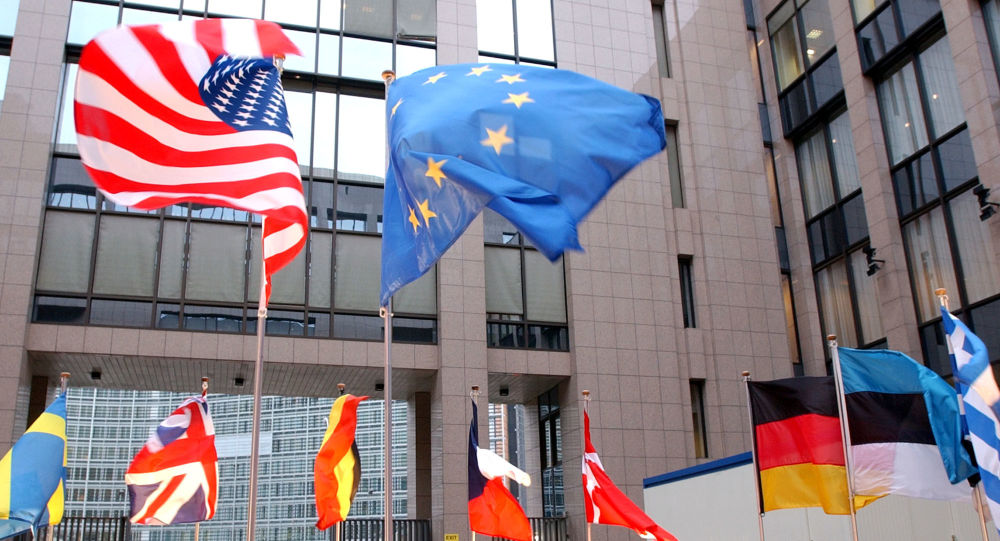
 The European Commission vowed to consider countermeasures in response to the new US law on anti-Russian sanctions which risk damaging Europe's economic interests. At the same time, Brussels is unlikely to engage in a full-fledged standoff against Washington.
The European Commission vowed to consider countermeasures in response to the new US law on anti-Russian sanctions which risk damaging Europe's economic interests. At the same time, Brussels is unlikely to engage in a full-fledged standoff against Washington.
The law presumes sanctions against Russia's defense, intelligence, mining, shipping and railway industries and restricts dealings with Russian banks and energy companies. In addition, the US will continue to oppose the implementation of the Nord Stream 2 gas pipeline project, citing the alleged adverse impact it exerts on the energy security of the European Union.
The law also limits the US president's ability to ease any sanctions on Moscow by requiring congressional approval to lift any restrictions.
On Wednesday, the White House also issued an official statement in which Trump said that the law remains "seriously flawed." In particular, the US president expressed concerns that the new sanctions against Russia will hurt the interests of Washington’s allies in Europe.
'Violation of International Law'
Brussels vowed to take measure to defend its economic interests in the face of a new round of anti-Russian sanctions.
"We are ready … We must defend our economic interests, including vis-a-vis the United States, and we shall do that," European Commission President Jean-Claude Juncker told the NDR radio broadcaster.
The German Foreign Ministry told Sputnik on Wednesday it recommended that the US launch close consultations with the EU on the issue of the bill expanding sanctions, signed by Trump."The way president Trump deals with this bill will be the deciding factor. We strongly recommend close discussion with the European Union," the ministry said.
German Economy Minister Brigitte Zypries said the new US sanctions bill violates international law and urged countermeasures.
"We consider this to be a violation of international law. The US cannot punish German companies because they run economic operations in another country… It is right for the EU Commission to take countermeasures now," Zypries told local media.
Unlikely Standoff
Andrei Suzdaltsev, the deputy head of the Department of World Economy and International Relations at the Moscow-based Higher School of Economics University, said that despite Berlin’s anger over the new sanctions, the German government is unlikely to stand against Washington."German companies have already invested billions in the construction of Nord Stream 2 and now they risk being punished by a third party, the US. In other words, they are told with whom they can and cannot work. Of course, this is a reason for anger. Brussels said it would consider countermeasures against the US, but they are unlikely in fact," Suzdaltsev told Radio Sputnik.
According to the expert, the main reason is the lack of unanimity over anti-Russian sanctions within Germany itself.
"Some German ministers support sanctions while others oppose them despite the fact that sanctions are not good for the EU’s interests. Moreover, [German Chancellor Angela] Merkel will run in the election. If there is a brawl with Washington she is likely to face problems. This is why so far the EU is unlikely to engage in a standoff with the US," Suzdaltsev pointed out.
EU Will Remain Vigilant
On Thursday, the European Commission said that the EU will deliver a response to the new US sanctions on a "case-by-case basis" as the bloc needs to see how the sanctions would be implemented.
At the same time, Brussels expressed hope that the final version of the US sanctions bill can potentially target less energy projects with Russian involvement than initially expected."You could see in the final bill that the threshold, upon which energy projects are to be sanctioned with Russian participation, is now much higher, which means much less projects could be potentially affected. This is a good sign but again – it would depend on implementation on the case-by-case basis. We will remain very vigilant," European Commission spokeswoman Mina Andreeva said.
The spokeswoman added that Brussels will hold consultations with Washington in order to voice its concerns over certain projects that can be targeted under the new law.



_jpg/250px-ElbeDay1945_(NARA_ww2-121).jpg)





